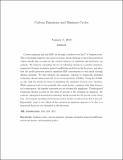Carbon emissions and business cycles
Author(s)
Khan, Hashmat; Metaxoglou, Konstantinos; Knittel, Christopher Roland; Papineau, Maya
DownloadAccepted version (520.0Kb)
Publisher with Creative Commons License
Publisher with Creative Commons License
Creative Commons Attribution
Terms of use
Metadata
Show full item recordAbstract
Carbon emissions and real GDP are strongly correlated over the U.S. business cycle. This relationship suggests that macroeconomic shocks inducing cyclical fluctuations in output should also account for the cyclical behavior of emissions and motivates our analysis. We begin by expanding the set of technology shocks in a popular emissions-augmented dynamic stochastic general equilibrium model from the literature, and show that the model generates positive emissions-GDP comovements to each shock through distinct channels. We then estimate the emissions’ response to empirically identified technology shocks using structural vector autoregressions (SVARs). Using the SVARs, we also rank the shocks in terms of explaining the emissions’ forecast error variation. While emissions tend to rise gradually after most shocks, consistent with their theoretical counterparts, the impulse responses are not statistically significant. Unanticipated technology shocks account for less than 10 percent of the variation in emissions. By contrast, anticipated investment technology shocks account for 25 percent of the variation. Government spending and monetary policy shocks account for less than 1 percent. Importantly, close to two thirds of the variation in emissions appears to be due to a structural shock not yet identified in the literature.
Date issued
2019-06Department
Sloan School of ManagementJournal
Journal of Macroeconomics
Publisher
Elsevier BV
Citation
Khan, Hashmat et al. "Carbon emissions and business cycles." Journal of Macroeconomics 60 (June 2019): 1-19 © 2019 Elsevier Inc
Version: Author's final manuscript
ISSN
0164-0704